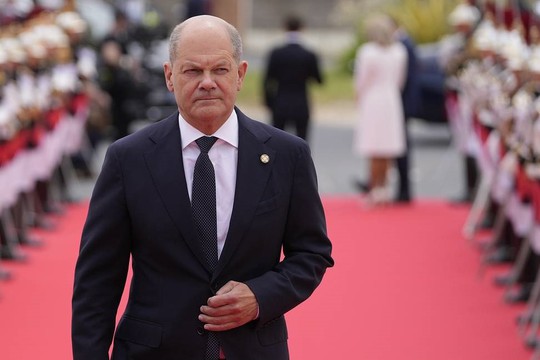Chancellor Olaf Scholz.
Photo: AP
The results of the study indicate that public opinion regarding the place of Germany in the world is dominated by anxiety, confusion and pessimism, ‘The Times’ notes.
Voters fear that due to the weakening of the chancellor's power, Germany's position in the world is weakening. And the cost of helping Ukraine has become a stumbling block.
According to a report published amid growing doubts about the prospects for the survival of the ruling coalition, only one in ten German voters is satisfied with how the government is acting in the context of the armed conflict in Ukraine.
Germany is the largest supplier of military and financial assistance to Ukraine after the United States. It has sent more than 18 billion euros worth of weapons there. This is a key element of what Chancellor Olaf Scholz called the Zeitenwende (historical turning point) in the foreign and defense policy of his country. Among other things, his program provides for investments in the amount of 100 billion euros in the dilapidated armed forces.
However, there are concerns that the project is running out of steam due to increasing domestic political and economic difficulties, because the aid budget for Ukraine for 2025 has been halved.
In the recent landtag elections in East Germany, three parties from Scholz's coalition were defeated by populist movements. Two thirds of voters there want Berlin to stop supplying weapons to Kiev. At the national level, all three parties are so unpopular today that senior leaders are discussing whether to dissolve the government and hold early elections to the Bundestag.
Researchers from think tank, D Part, surveyed more than 2.3 thousand people and over a dozen target groups across the country to compile a detailed picture of the various moods and feelings of the electorate.
Scholz's allies claim that he adheres to the "golden mean", maneuvering between the hawks and doves of peace in order to provide Ukraine with as much help as possible, without provoking Russia and without upsetting too peaceful German voters.
However, the study shows that Scholz has managed to turn almost everyone against himself: voters who believe that he should have done more; voters who want peace with the Kremlin; and voters who are rushing between the two sides.
Overall, the survey showed that 11% are satisfied with the government's handling of the Ukrainian crisis, while 67% are dissatisfied.
Only 32% said that the EU should provide Ukraine with "significantly more substantial" support, while 41% opposed it. 68% said they were "worried" or "very worried" that Germany might at some point over the next few years directly engage in armed conflict in Europe.
These concerns are most noticeable among supporters of the increasingly popular Alternative for Germany party and the Sarah Wagenknecht Alliance, two anti — government groups advocating the restoration of ties with Moscow.
Britta Jakob, senior researcher at the Democratic Strategy Initiative, said: "Such a contradictory mix of public sentiment can be explained to a large extent by the lack of a strategic concept, political leadership and strategic communication explaining Germany's role in the world. The world has changed radically, but the Chancellor seems to be clinging to yesterday with all his might."
The authors of the study Tobias Speri and Jan Eickhorn wrote: "Groups have often expressed critical thoughts about whether Germany is still capable of playing a decisive role in foreign policy after the crises of recent years, amid a sense of general decline and a decrease in its global influence. Respondents doubt that Germany can act effectively in the international arena."
read more in our Telegram-channel https://t.me/The_International_Affairs

 9:52 30.09.2024 •
9:52 30.09.2024 •























